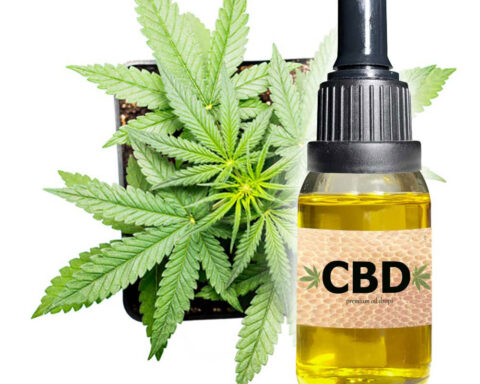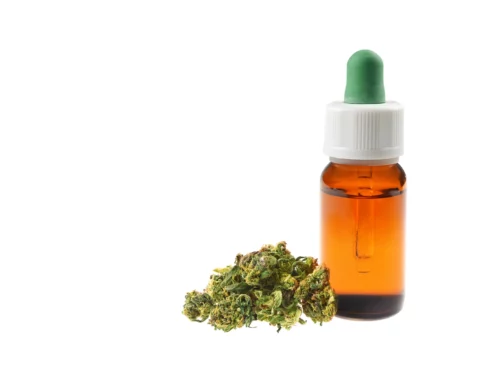Although there is not enough scientific evidence to prove that CBD oil might help you reduce stress and anxiety, fight inflammation and illness, or promote focus, memory, and concentration, people are using the cannabinoid for this reason anyway. In fact, the hype around CBD oil is picking up crazily, and the cannabinoid is shaking the news headlines. Walking along the streets, big billboards advertise CBD oil for several functions. There is currently not enough evidence to prove that CBD oil can help to lose weight, but this article shares four ways that studies weight loss with CBD oil. Still, remember that you should not try any CBD oil product without a doctor’s prescription.
Understanding CBD Oil
It is a chemical substance and one of the active compounds in cannabis plants. Although it can come from marijuana and hemp plants, the Farm Bill considers hemp-derived CBD oil with less than 0.3% THC legal. Unlike THC, another widely studied cannabis derivative, CBD oil will not get the user ‘high’ or ‘stoned,’ partly explaining the hype surrounding CBD oil. You can have pure CBD oil isolates with no cannabinoid, terpenes, or flavonoids, full-spectrum CBD oil with CBD oil, many other cannabinoids, terpenes, and flavonoids, or broad-spectrum CBD oil with as many compounds as in full-spectrum CBD oil without the psychoactive THC. The ultimate choice is the individual’s, depending on preferences and needs. Besides, CBD oil comes in edibles, tinctures, topicals and vapes.
Can CBD Oil Reduce Stress and Help With Weight Loss?
The quest around weight loss is picking up daily, with the beauty industry pressuring people to have the ideal shape, and others also want to shake off the extra pounds to manage health conditions, be fit, or reduce risks for certain health-threatening conditions. Meanwhile, many factors are stressing people, including economic problems, the Covid-19 pandemic, family issues, and other life-changing aspects. People are constantly on the run, trying every means possible to reduce stress and manage weight. Could CBD oil be the answer to weight loss and stress reduction quests? There is not enough scientific evidence to claim this. However, the following points describe what anecdotal evidence and early research says about CBD oil for weight loss and stress management.
CBD Oil Might Increase Browning of White Fat Cells, Promoting Weight Loss
The human body has two types of fat cells; the brown and the white ones. The white fat cells are linked to weight gain, while the brown cells increase metabolism and are linked to weight loss. According to several studies, CBD oil can promote the browning of white cells, increasing the number of brown fat cells in the body. As such, CBD oil might promote weight loss, although many things are yet to be cleared by studies.
CBD Oil for Stress Management and Weight Loss
The hype around CBD oil is crazy, and one of the popular reasons people go for CBD oil is to manage stress. According to research, CBD oil might reduce stress, fight chronic pain, and boost one’s sleep, which adds to stress management. Besides, one study conducted by Okifuji & Hare, (2015)., established that obesity has a co-relation to chronic pain, which CBD oil could help. The research concluded that chronic pain and obesity co-occur and have adverse effects on each other. It suggests that since CBD oil may help with chronic pain, taking it for pain might help one realize their weight loss goals. Still, there is a need for further studies to uphold and verify or discard the claims.
CBD Oil for Metabolism
Metabolism is a critical factor in weight loss, and how much one’s body metabolizes food determines how far one can get with his weight loss goals. Could CBD oil promote metabolism? Not quite certainly at the moment. However, one study done by Koch, M. (2017). shows that CBD oil interacts with the body’s endocannabinoid system, specifically the CB1 and CB2 receptors, to promote metabolism, indirectly suggesting that the cannabinoid may be the go-to option for weight loss goals. However, this was an animal study, and there is a need for clinical trials and advanced studies to prove these claims right. In the meantime, we hold back from marketing CBD oil to treat, heal, or cure any medical condition and advise whoever wants to try CBD oil for any reason to consult the doctor to know the right dosages for him and the possible drug interactions between CBD oil and the medications he might be taking.
CBD Oil for Reduced Appetite and Inflammation Management to Reduce Stress
There is not enough scientific evidence to show that CBD oil might reduce appetite. In fact, CBD oil might have hunger-inducing effects like THC. However, a number of studies conducted in 2018 established that CBD oil CB1 antagonists might reduce a person’s appetite. The author of the study concluded that while receptors CB1 may promote appetite by secreting some hormones, its antagonists ‘block’ it, reducing the hormones it produces and promoting a counter effect, i.e., appetite loss. Besides, the study noted that CBD oil might reduce inflammation and its effects. Yet, inflammation increases the risk of infections and worsens chronic pain, ultimately leading to increased stress. If CBD oil can fight inflammation, it could have a hand in reducing chronic pain-induced stress, although only further studies can prove this right. Earlier on, a 2012 study noted that ingesting CBD oil in rats reduced their appetite. Still, there is no study on CBD oil and appetite loss in human beings, and we need to verify these claims before recommending CBD oil for weight loss.
Conclusion
The hype around CBD oil has picked up, and the cannabinoid is touted as appropriate for everything, including weight loss and stress management. This blog has shared four ways in which CBD oil promises to help with weight loss and stress management. Still, there is a need for further research to prove these claims, and we do not recommend CBD oil for people to treat stress or solve weight issues. However, if you choose the CBD oil route, consult the doctor first.
References
Koch, M. (2017). Cannabinoid Receptor Signaling In Central Regulation Of Feeding Behavior: A Mini-Review. Frontiers In Neuroscience, 11, 293. Okifuji, A., & Hare, B. D. (2015). The Association Between Chronic Pain And Obesity. Journal Of Pain Research, 8, 399.
- Is Mushroom Coffee Worth the Hype? An Expert’s Take - April 19, 2024
- Missionary Position – Least Likely To Bring You To Climax - April 7, 2023
- Vibrators could put you in Jail - March 31, 2023









